Avoiding recovery sabotage and setbacks
August 1, 2025
Building Resilience for Lasting Sobriety

Understanding and Navigating Recovery Risks
Recovery from addiction is a complex journey filled with challenges, setbacks, and opportunities for growth. A critical aspect of sustained sobriety is recognizing and avoiding behaviors and circumstances that can sabotage progress. This article explores key strategies to prevent relapse and setbacks, understand the psychological roots of self-sabotage, and cultivate resilience for long-term recovery.
Recognizing Self-Sabotage in Recovery
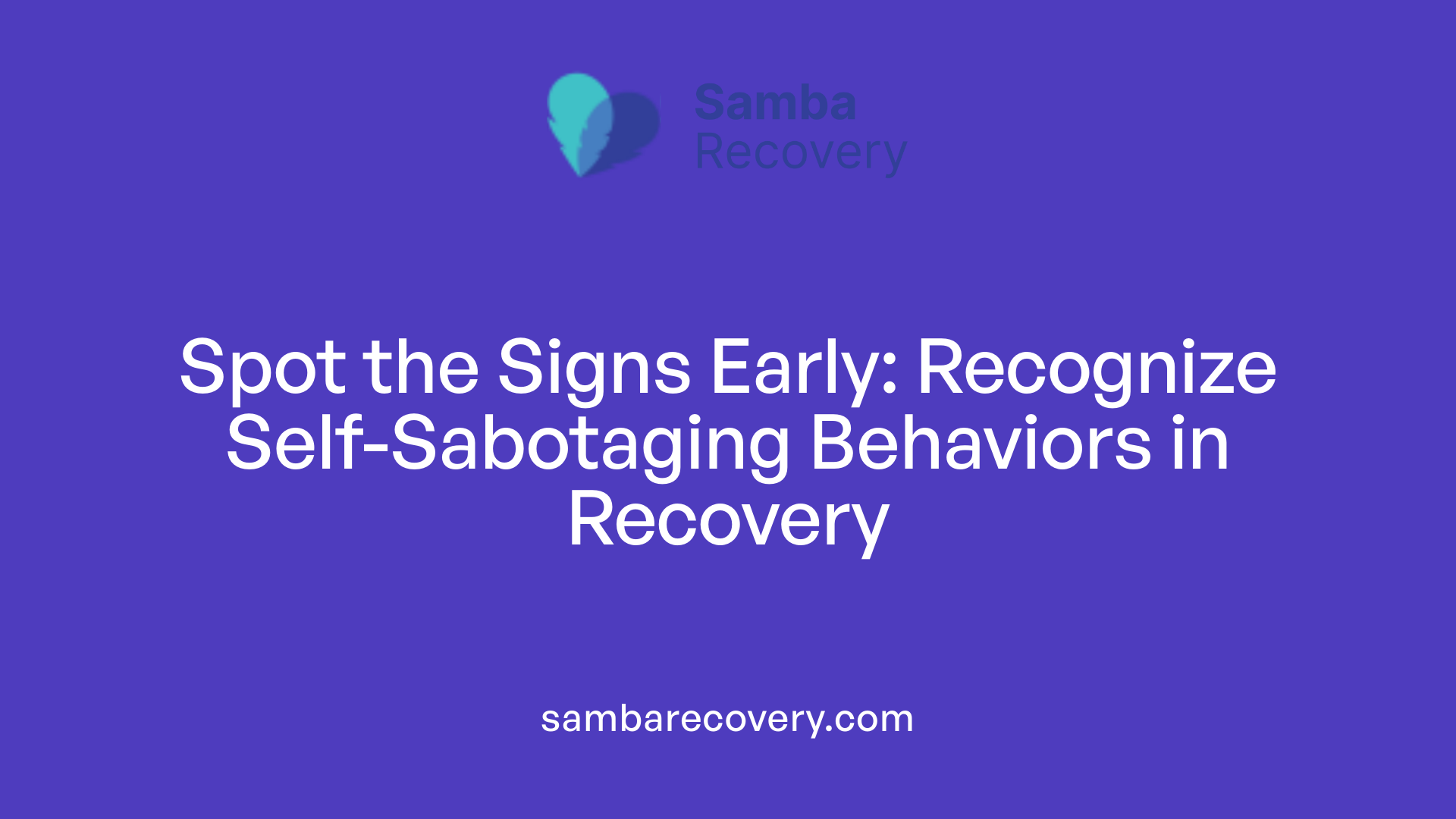
What are common self-sabotaging behaviors during recovery?
During addiction recovery, self-sabotage can manifest through various destructive behaviors that hinder progress. Common signs include negative self-talk, which involves persistent self-criticism and feelings of unworthiness. Procrastination often delays engagement in therapy or support groups, while avoidance of support systems can lead to isolation. Relapse triggers, such as high-stress situations or toxic environments, may provoke setbacks.
Perfectionism and setting unrealistic expectations can also prevent individuals from acknowledging their achievements or taking necessary risks for growth. These behaviors are frequently rooted in underlying emotional issues, like guilt, trauma, or shame, which create negative core beliefs about oneself.
One of the core challenges in recovery is identifying these behaviors early. Recognizing signs such as minimizing progress, reconnecting with unhealthy relationships, or engaging in destructive habits can serve as indicators of self-sabotage.
Behavioral patterns driven by emotional issues like guilt, trauma, or shame
Many self-sabotaging actions stem from unresolved emotional pain. Guilt and shame from past experiences can lead individuals to believe they are undeserving of sobriety or happiness. Trauma, whether recent or childhood, may cause subconscious fears that undermine recovery efforts.
These emotional issues often foster negative thought patterns, including self-blame and hopelessness. Such beliefs promote behaviors like avoidance of therapy, neglect of self-care, or engaging in risky situations to momentarily escape emotional discomfort.
Addressing these deep-seated issues through therapy or support groups is crucial. It helps to challenge destructive core beliefs, develop healthier coping skills, and foster self-compassion—essential steps to prevent self-sabotage.
The cycle of self-sabotage involving discomfort, denial, relief, shame, and negative self-talk
Self-sabotage frequently follows a recurring cycle. It begins with feelings of discomfort or emotional distress, such as anxiety or depression, which individuals may deny or suppress. To avoid facing these feelings directly, they might engage in avoidance behaviors like substance use or withdrawing from support.
This temporary relief is often followed by feelings of shame and guilt once the avoidance is recognized, fueling negative self-talk that reinforces low self-esteem. This cyclical pattern entrenches self-destructive behaviors, making recovery more difficult.
Breaking this cycle requires awareness of these emotional states and understanding that setbacks are normal parts of healing. Developing mindfulness, practicing self-compassion, and seeking therapeutic support can help individuals confront and manage discomfort healthily. Recognizing this cycle enables individuals to respond proactively, reducing the risk of relapse and promoting sustained recovery.
Strategies to Prevent Relapse
What strategies can be used for relapse prevention?
Preventing relapse requires a proactive approach tailored to each individual's specific needs and circumstances. Developing a personalized relapse prevention plan is a crucial first step. This plan should identify personal triggers—both external, such as certain environments and social situations, and internal, like stress, boredom, or negative emotions.
A comprehensive plan includes practical coping skills to manage these triggers effectively. Mindfulness meditation helps individuals stay present and centered, reducing impulsive reactions to cravings. Deep breathing exercises and grounding techniques can calm the mind and body during moments of emotional distress or in high-pressure situations.
Building and maintaining strong support networks through participation in support groups, such as 12-step programs or peer support groups, provides ongoing accountability and emotional reassurance. Maintaining honest communication with therapists and trusted friends fosters an environment where struggles can be addressed early.
Adopting healthy lifestyle habits also plays a vital role. Regular exercise, a nutritious diet, and quality sleep can improve overall well-being and resilience. Incorporating practices like yoga or massage can further reduce stress levels.
Recognizing early warning signs of potential relapse—such as emotional changes, withdrawal, or feeling overwhelmed—and knowing how to avoid high-risk situations are essential. This might include avoiding certain people or environments associated with substance use.
Utilizing therapeutic techniques like Cognitive Behavioral Therapy (CBT) can equip individuals with new, healthier ways to handle negative thoughts and emotions. These strategies collectively support sustained recovery and significantly decrease the chances of relapse.
Managing Setbacks Effectively
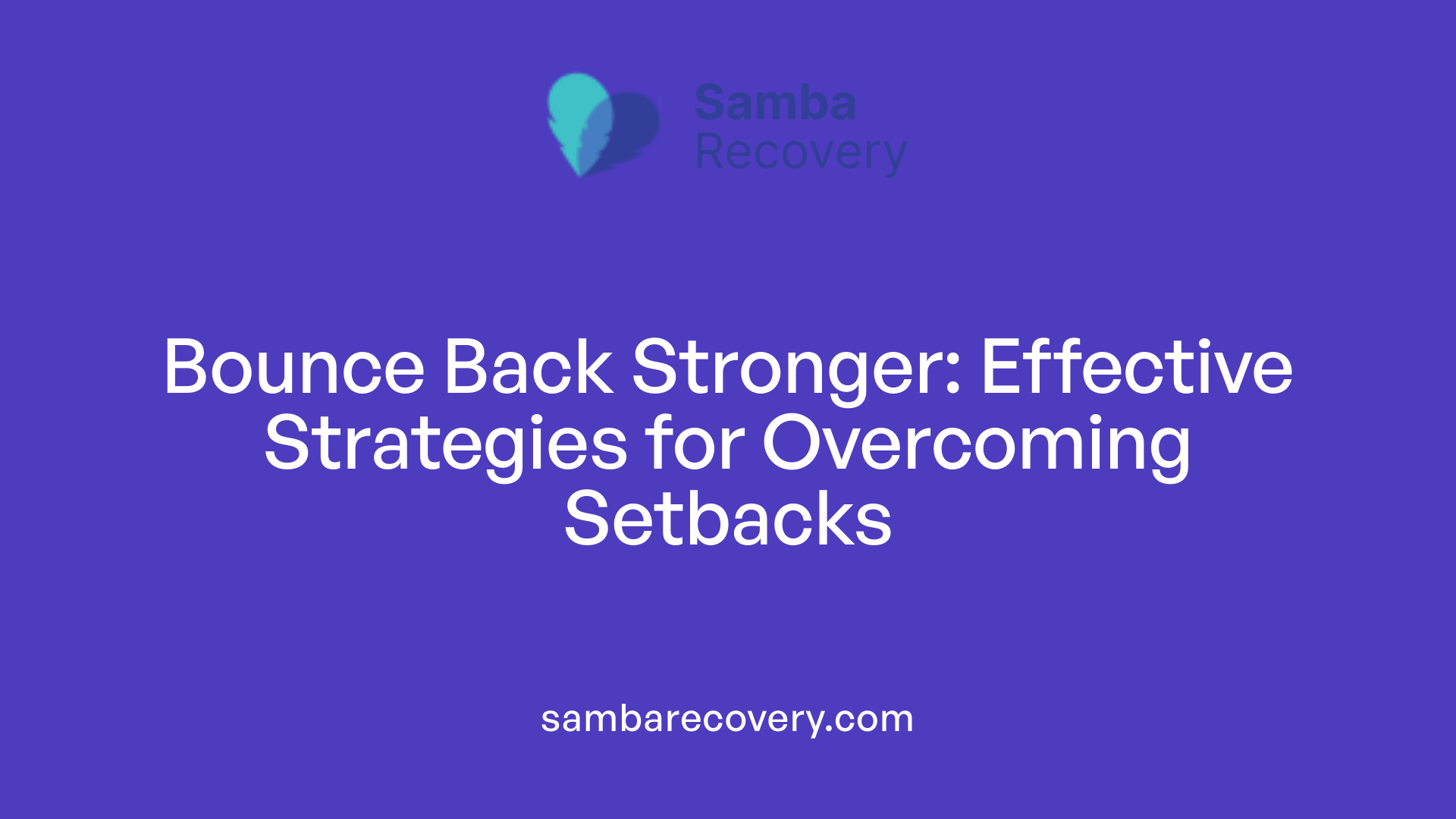 Recovery from addiction is a journey filled with ups and downs, making it vital to know how to handle setbacks when they occur. A pivotal factor in managing these challenges is maintaining a robust support network. Friends, family members, support groups such as 12-step communities, and mental health professionals offer encouragement, accountability, and guidance. Their presence helps individuals stay connected and motivated, especially during difficult times.
Recovery from addiction is a journey filled with ups and downs, making it vital to know how to handle setbacks when they occur. A pivotal factor in managing these challenges is maintaining a robust support network. Friends, family members, support groups such as 12-step communities, and mental health professionals offer encouragement, accountability, and guidance. Their presence helps individuals stay connected and motivated, especially during difficult times.
Recognizing emotional setbacks is equally important. Feelings of frustration, shame, or hopelessness can surface during this phase. Addressing these emotions through therapy, mindfulness practices, and healthy coping strategies such as exercise or journaling can significantly strengthen emotional resilience. These methods foster self-awareness and help regulate emotional responses, making it easier to bounce back.
Setting realistic, achievable goals is essential to sustaining progress. Short-term milestones and long-term visions serve as motivation and remind individuals of their growth. Viewing setbacks as opportunities for learning rather than failures encourages a positive outlook. This perspective reduces self-blame and promotes perseverance.
Understanding that relapse or setbacks are common in recovery can alleviate unnecessary guilt. Accepting setbacks as part of the process enables individuals to analyze what triggered the difficulty and develop better strategies for the future. Additionally, reducing external stressors—such as resolving conflicts or managing environmental triggers—can prevent setbacks. Using tools like guided meditations, recovery apps, or calming routines further supports continuous motivation.
Overall, combining emotional awareness, realistic goal setting, a supportive environment, and helpful resources creates a strong foundation for overcoming setbacks. Embracing setbacks with resilience and compassion is key to long-term success in addiction recovery.
Understanding Psychological Roots of Self-Sabotage
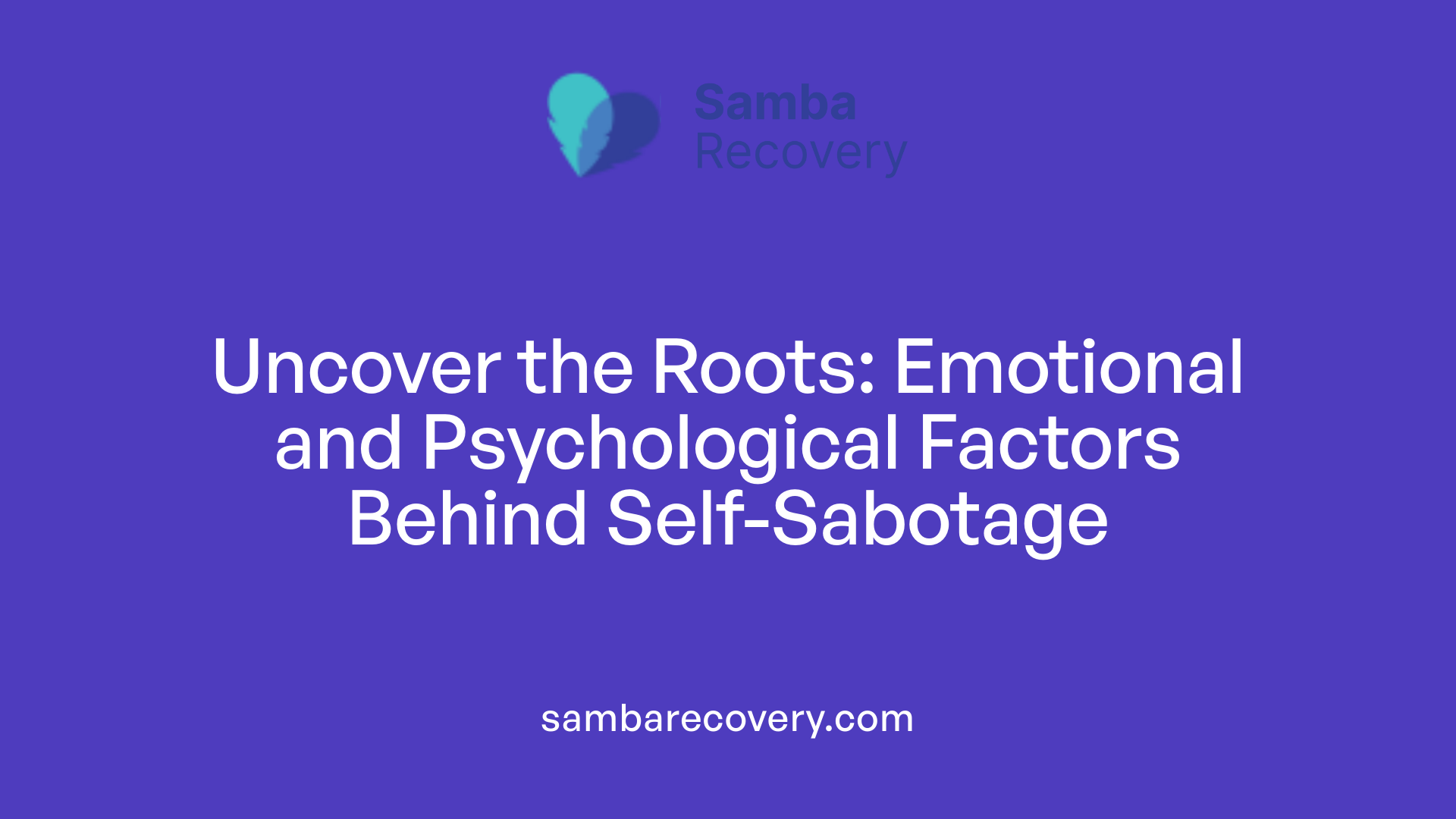 Self-sabotaging behaviors are deeply rooted in our psychological makeup, influenced by a variety of emotional, cognitive, and past experiences. One of the primary contributors is low self-esteem and feelings of guilt or unworthiness, which can prompt individuals to act in ways that undermine their own success and happiness. Traumatic experiences or unresolved emotional pain from childhood or past relationships often leave lasting marks, shaping negative core beliefs about oneself.
Self-sabotaging behaviors are deeply rooted in our psychological makeup, influenced by a variety of emotional, cognitive, and past experiences. One of the primary contributors is low self-esteem and feelings of guilt or unworthiness, which can prompt individuals to act in ways that undermine their own success and happiness. Traumatic experiences or unresolved emotional pain from childhood or past relationships often leave lasting marks, shaping negative core beliefs about oneself.
The impact of mental health disorders such as depression, anxiety, and ADHD also plays a role. These conditions can alter brain chemistry, reducing levels of chemicals like dopamine and serotonin that are vital for mood regulation, leading to behaviors driven by pain, fear, or impulsivity.
Fear of failure or success is another significant factor. Many fear achieving their goals because of the potential for disappointment or change, causing them to avoid or sabotage efforts. Perfectionism and a need for control can foster procrastination and avoidance, as individuals may prefer to stay within their comfort zones.
From a neuropsychological perspective, self-sabotage can be seen as a manifestation of dysfunctional thought patterns and emotional regulation issues. Psychodynamically, it may serve as a defense mechanism to shield oneself from pain or rejection. Cognitive theories emphasize the role of negative self-talk and distorted beliefs that reinforce feelings of inadequacy and fear.
Behaviorally, avoidance, self-criticism, and risky behaviors are often responses to internal conflict and emotional distress. Anxiety, depression, and unresolved trauma contribute to this cycle, making it difficult to maintain consistent, positive behaviors. Addressing these underlying psychological factors through therapy, self-awareness, and support can break the cycle of self-sabotage and promote healthier self-interactions and growth.
Stages of Relapse and Prevention Tactics
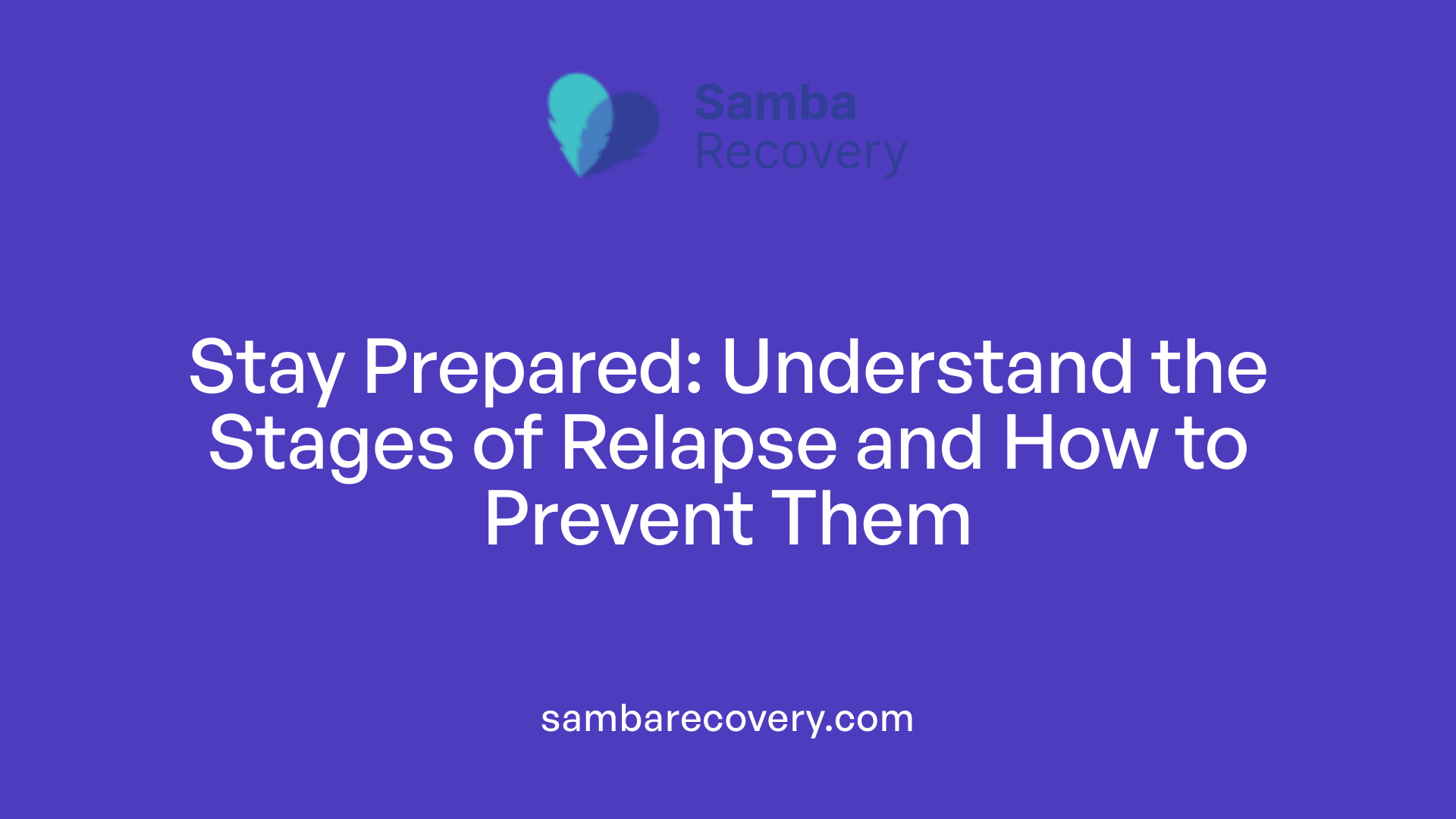
What are the stages of relapse and how can they be managed?
Relapse in addiction recovery is a gradual process that unfolds through three main phases: emotional, mental, and physical relapse. Recognizing the signs in each stage can make a significant difference in preventing a full return to substance use.
In the emotional stage, individuals often experience feelings of irritability, mood swings, withdrawal from social activities, and neglect of self-care routines. These emotional shifts can occur weeks or even months before any external signs of relapse appear. Managing this stage involves honest self-reflection, increasing awareness of emotional states, and practicing self-compassion.
The mental stage is characterized by intrusive thoughts and cravings. Here, individuals might fantasize about substance use, rationalize their behaviors, or begin planning how to relapse. This internal conflict creates a fertile ground for relapse if left unaddressed. Recognizing these thoughts early and employing cognitive strategies like cognitive restructuring or mindfulness can help.
The physical stage is the culmination of preceding phases, where the person actually consumes substances. It may be triggered by high-stress situations, emotional triggers, or environmental cues. Warning behaviors at this stage include lying about usage, neglecting responsibilities, or hiding substances.
Effective strategies to manage relapse include openly sharing feelings with trusted support persons or professionals, practicing self-care to improve emotional resilience, and employing distraction techniques such as engaging in hobbies or physical activity. Additionally, seeking ongoing support through therapy sessions or support groups can create a safety net during vulnerable times.
Maintaining awareness of early warning signs and employing proactive techniques plays a crucial role in relapse prevention. Cultivating a strong support network and developing healthy coping skills foster long-term recovery and help navigate the complexities of each relapse stage.
The Role of Therapy and Support Networks
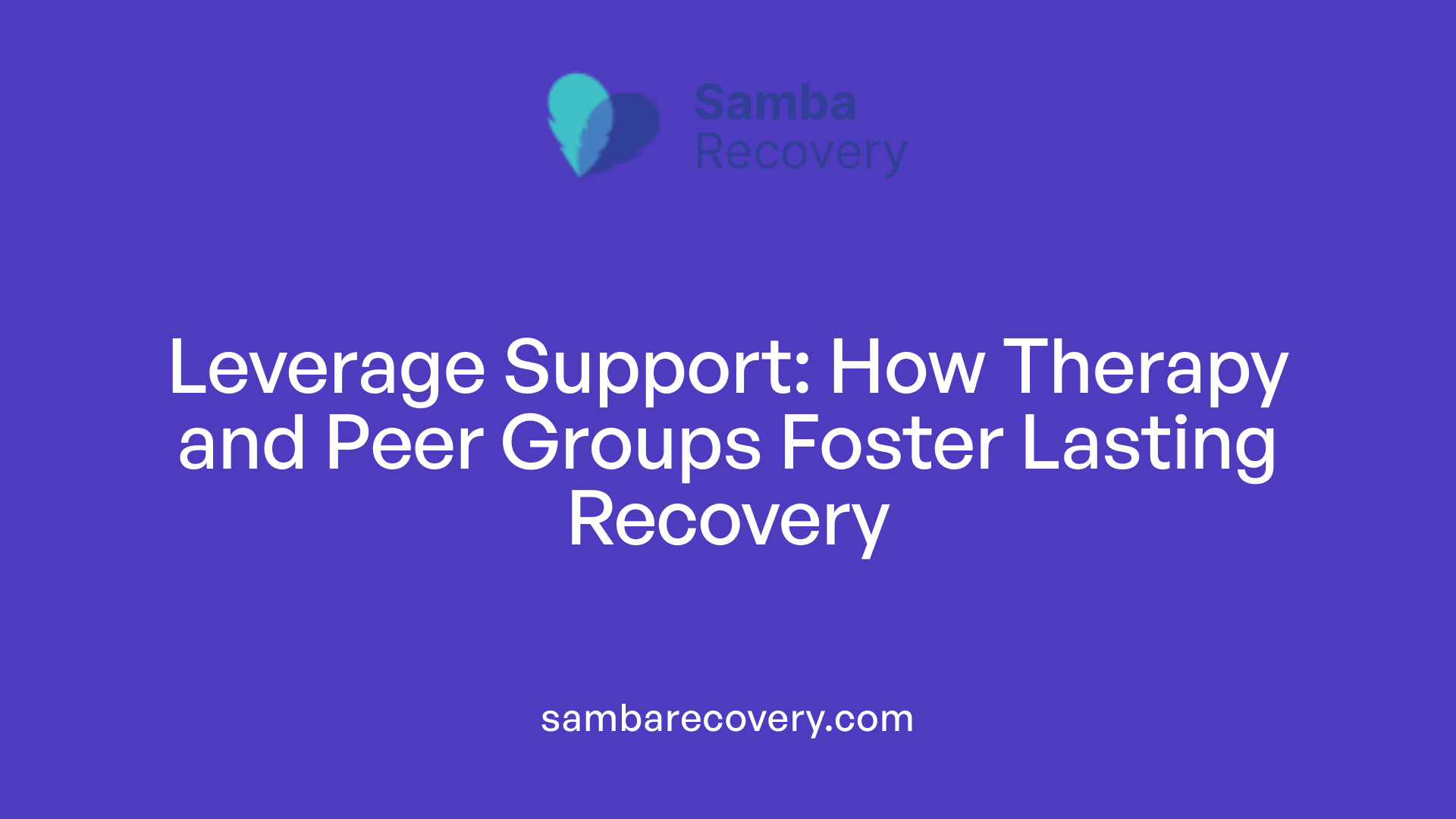
How do therapeutic approaches help identify and change self-defeating patterns?
Therapies such as cognitive-behavioral therapy (CBT), dialectical behavior therapy (DBT), and other counseling methods are instrumental in helping individuals recognize and alter self-sabotaging behaviors. CBT focuses on identifying negative thought patterns and replacing them with healthier ones, which can reduce behaviors like negative self-talk or procrastination. DBT emphasizes emotional regulation and mindfulness skills, allowing individuals to better handle intense feelings without resorting to destructive coping mechanisms.
Through these approaches, clients learn to understand the root causes of their sabotage—such as unresolved trauma, low self-esteem, or distorted beliefs—and develop practical strategies to overcome them. Therapy provides a safe space to explore fears, confront denial, and build resilience against triggers that could lead to relapse or emotional setbacks.
Why are support groups like 12-step programs and peer support important?
Support groups like Alcoholics Anonymous and other 12-step programs create communities rooted in shared experiences and mutual accountability. These groups offer a sense of belonging, reduce feelings of loneliness, and provide ongoing encouragement to maintain sobriety. Peer support helps individuals see they are not alone in their struggles, fostering motivation through collective wisdom and empathy.
Participation in group meetings also reinforces commitment to recovery, offers accountability, and encourages honest sharing about setbacks or fears. This openness is vital for recognizing self-sabotaging behaviors early and addressing them with community support.
How can building a network that fosters honesty, accountability, and emotional safety help?
A supportive, honest network is essential for sustained recovery. Constructive relationships with friends, family, sponsors, and mental health professionals create an environment where individuals feel safe to share their struggles and successes. This honesty helps identify behaviors that might be undermining recovery, such as avoidance, denial, or toxic relationships.
Accountability within this network encourages consistent effort and honesty about setbacks or doubts. Emotional safety allows individuals to express vulnerabilities without fear of judgment, which enhances self-awareness and resilience against relapse.
How does addressing mental health issues contribute to reducing sabotage?
Many self-sabotaging behaviors are linked to untreated mental health conditions like depression, anxiety, or trauma. Addressing these issues through proper therapy, medication, or holistic approaches reduces emotional distress that may lead to relapse or destructive actions.
Healing from trauma and managing mental health improves overall emotional stability, making it easier to stick to recovery plans. When underlying psychological issues are acknowledged and treated, the likelihood of emotional and mental relapse diminishes, supporting a healthier, more sustainable recovery journey.
Embracing Change and Cultivating Self-Compassion
Understanding the roots of self-sabotage and relapse empowers individuals in recovery to implement effective prevention strategies. Developing self-awareness, building a strong support network, practicing mindfulness, and addressing underlying emotional issues are essential for avoiding setbacks. Recovery is a gradual process that involves patience, resilience, and self-compassion. By acknowledging that setbacks are a normal part of growth and learning, individuals can foster a healthier attitude toward their journey, increasing the likelihood of lasting sobriety and personal fulfillment.
References
- Recognizing Sabotage From Loved Ones (But Also From You)
- Relapse Prevention and the Five Rules of Recovery - PMC
- Fears That Can Sabotage Recovery and How to Manage Them
- How to Avoid Sabotaging Your Addiction Recovery - Into Action
- Recognizing and Overcoming Self-Sabotage in Recovery
- 6 Self-Defeating Behaviors to Avoid in Recovery
- Identify and Overcome Self-Sabotage | Trauma Recovery
- 7 Strategies to Stop Self-Sabotage in Sobriety
- How to Handle Setbacks Without Losing Hope in Addiction Recovery
About Samba Recovery
Start your treatment today!

Featured Articles
Read the latest addiction news and recovery tips from our blog.
Samba Recovery never miss an opportunity
Substance use may be part of your story, but it doesn’t have to be the rest of it. Sustainable recovery is possible and the best version of yourself is waiting at our Atlanta and Savannah, Georgia addiction recovery centers.
We’ll help you learn that the opposite of addiction is connection. We’ll give you skills to discover your self-worth and show you the tools for a life of hope and promise.
Contact us today!
We accept most major insurances
We partner with most major insurances, enabling you to access premier therapy services.










































































































